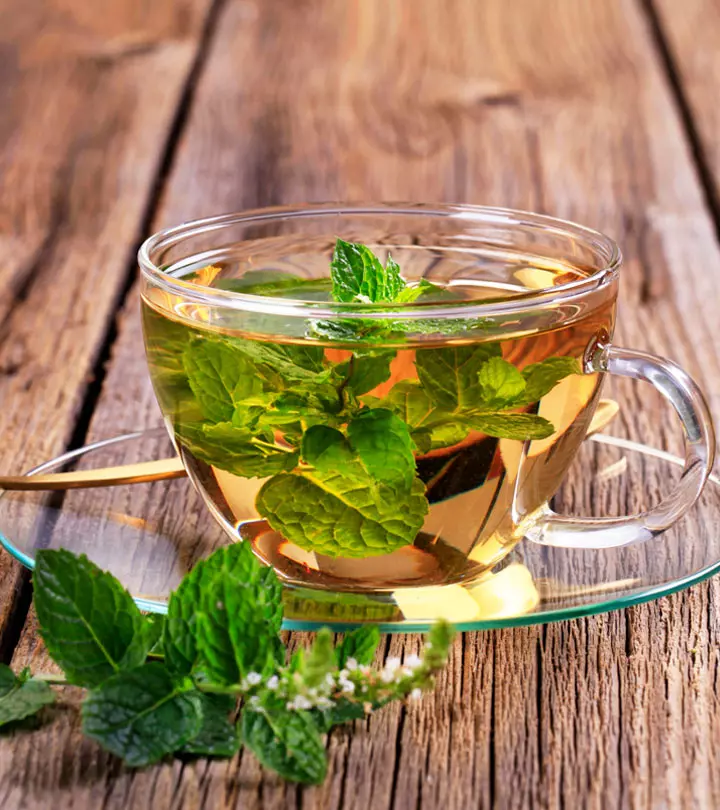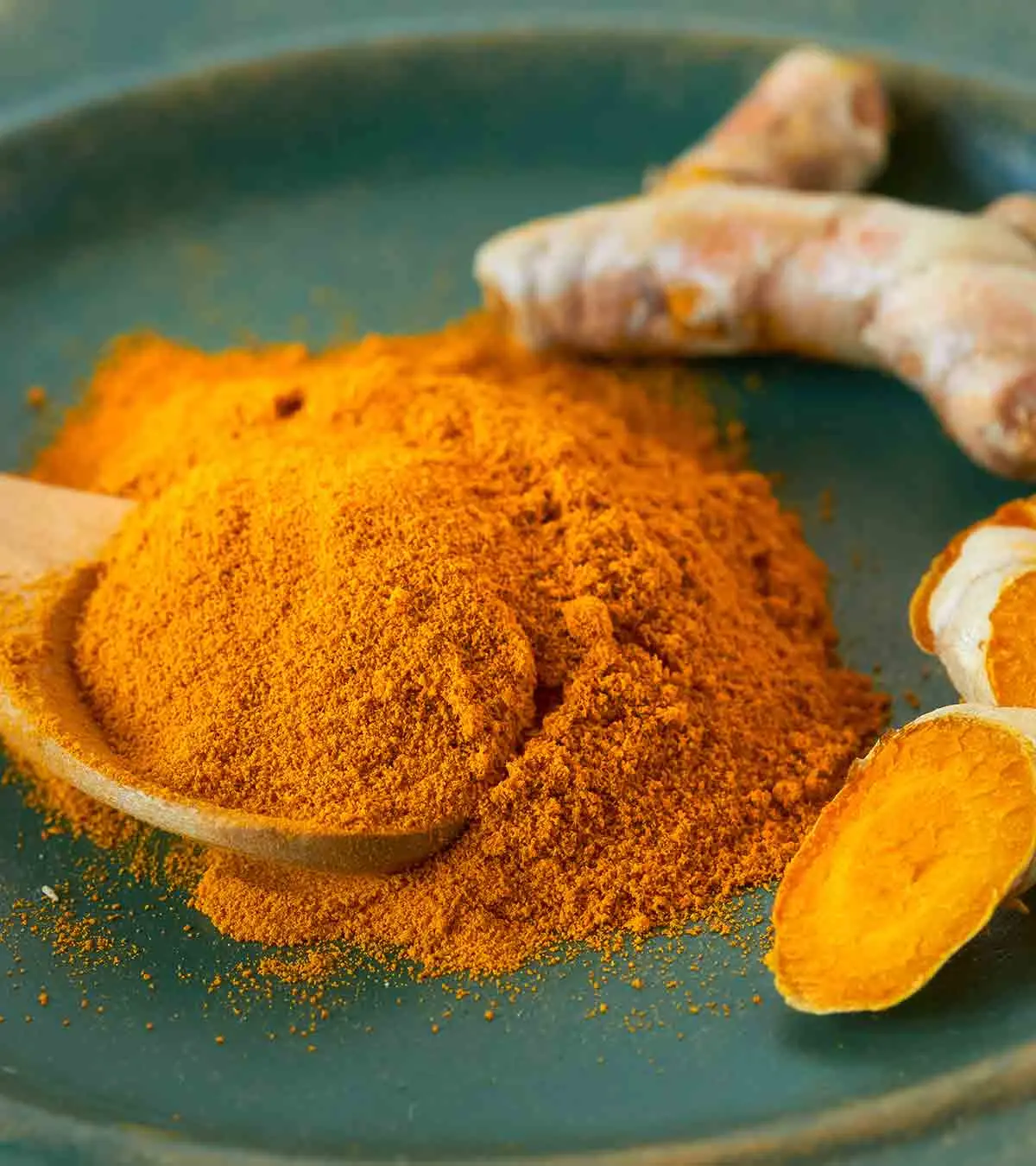
Image: ShutterStock
Peppermint is a herb used to add soothing and cooling effects in various commercially available products. However, is it safe to consume peppermint tea while breastfeeding? A lactating mother often needs to follow various dos and don’ts when it comes to food, beverages, or medications as they may reach the infant through breast milk. Although peppermint tea is known for its soothing properties, its effects on lactation and milk supply are often questioned. Continue reading this post as we discuss the safety attributes of drinking peppermint tea for nursing mothers.
Key Pointers
- Peppermint is an herb that has cooling and soothing properties, and is used to treat gum pain and digestive issues.
- Peppermint tea has various benefits, including healing sore nipples, relieving pain, reducing stress, alleviating sinus problems, and aiding weight loss.
- However, lactating women should be cautious about consuming excessive amounts of peppermint, as it can have side effects such as reducing breast milk supply, triggering allergies, and interacting with other drugs.
- To avoid these issues, it’s recommended to consume peppermint in moderation and consult a medical practitioner before doing so.
What Is Peppermint?

Image: IStock
Peppermint is a soothing herb best known for treating gum pain, stomach problems and digestive problems. Several commercial products like toothpaste, chewing gum and tea contain peppermint. The calming and numbing effect of peppermint treats headaches, menstrual cramps, anxiety, nausea, diarrhea, skin irritation, and flatulence. Peppermint is also used as an active ingredient in chest rubs and vaporizers. The active ingredient of Peppermint, Menthol and methyl salicylate, possess antifungal, antibacterial, and antiviral properties. Researchers also state that peppermint may cure indigestion and IBS or Irritable Bowel SyndromeiA digestive system disorder in which symptoms such as abdominal pain and frequent changes in bowel movement coexist. (1) .
Can You Drink Peppermint Tea While Breastfeeding?
You may drink a moderate amount of peppermint tea during lactation. While there is no specified quantity, you may limit your maximum daily intake to a cup, which is 236 ml or 8 fl. oz. Try consuming the daily maximum intake across various servings rather than having it all at once. This allows the body to process the tea and reduces the quantity of compounds reaching the breast milk. You may aim to have peppermint tea after a breastfeeding session rather than before it.
Benefits Of Peppermint Tea While Breastfeeding
Here are some positive attributes of peppermint tea while breastfeeding:
1. Reduces nipple soreness
- With the onset of lactation (for first-time mothers), your nipples often become swollen, and you may experience severe pain while feeding your newborn baby. Sore nipples are a common experience for new mothers as they embark on the journey of motherhood.
- You can dampen a cotton dab in lukewarm peppermint tea and apply it to your nipples. It helps you get relief from pain and inflammation.
- The antibacterial property of peppermint increases your tissue flexibility and helps you prevent nipple pain and soreness.
 Point to consider
Point to consider2. Relieves pain

Image: Shutterstock
- Doctors may advise you to drink a few sips of peppermint tea to eliminate pain due to trapped gas after a C-section.
- When you use peppermint tea as a pain reliever, it is best to limit your intake to only one or two cups a day.
- Peppermint tea contains a small amount of methanol, so consuming only a few cups would not affect your breast milk supply.
3. Stress relief
- Peppermint tea is an excellent energy booster and helps you overcome stress and anxiety while you are breastfeeding. According to the Centers for Disease Control and Prevention, approximately 13% of women who have recently given birth experience symptoms of postpartum depression. Peppermint tea might help new mothers feel relaxed.
- The methanol present in the herbal tea serves as a muscle relaxant and offer tremendous relief from stress.
- Drinking peppermint tea before going to bed helps you have a restful sleep.
4. Sinus relief
- The soothing effect of methanol clears sinusiHollow, air-filled spaces in the skull. congestion and cures a sore throat.
- Peppermint tea, also regarded as a natural decongestant, cures common cough and cold.
5. Weight loss

Image: IStock
- After childbirth, most nursing mothers seem to gain unwanted body weight, especially after the c-section surgery.
- With an intake of peppermint tea, you can get rid of your unwanted pounds. The herbal tea serves as an appetite suppressant and keeps you full for longer.
- Drinking a perfect blend of green tea and peppermint tea can regulate your metabolic rateiThe rate at which the body consumes energy for physiologic functions such as respiration, digestion, and blood circulation. and makes it easier for your body to shed the extra pounds.
6. Cures stomach problems
- Peppermint tea cures several stomach ailments like bloating and gas.
- Having a cup of peppermint tea helps you overcome gastrointestinal problems and makes it easier for you to digest foods.
Side Effects Of Peppermint Tea While Breastfeeding
Lactating mothers should remain alert of the following side-effects of peppermint tea while breastfeeding :
1. Reduces breast milk supply
- Drinking excess amounts of peppermint tea may reduce the breast milk supply.
- As a lactating mother, when you experience an oversupply of breast milk or weaning, the doctor may advise you to consume a small quantity of peppermint tea.
2. Contamination
- The FDA does not oversee the production of peppermint tea or any other herbal tea sold in the market. The tea can contain harmful contaminants, including pesticides.
- It is often advisable to buy herbal tea from a reputable manufacturer to overcome the risk of contamination.
3. Acid reflux

Image: Shutterstock
- If you suffer from gastroesophageal reflux disease (GERD) or acid reflux, drinking peppermint tea may complicate your health condition.
- The soothing herb promotes relaxation of the valve that separates the stomach from the esophagus.
- It triggers the backflow of the stomach acid into your esophagus, and your condition gets worse.
4. Reduction in blood sugar level
- One of the major side effects of drinking peppermint tea in excess quantity is that it reduces the blood sugar level suddenly.
- So, if you are diabetic or high-pressure patient, it is better to eliminate peppermint tea from your diet.
5. Causes allergies
- Some people seem to be allergic to methanol. Some of the typical signs of allergy include tremors, headache, mouth soreness, and shaky feet.
6. Drug interactions
- Researchers conclude that peppermint tea interferes with several prescribed medications.
- You should never intake peppermint tea, when you already consume drugs for blood pressure, stomach acid, diabetes, and cyclosporine.
- If you are allergic to menthol or suffering from chronic asthma, it is best to stay away from peppermint tea/oil.
- An overdose of peppermint tea leads to several adverse effects including muscle pain, tremors, diarrhea, drowsiness, and an abnormal heart rate.
 Quick fact
Quick factA Word Of Caution
- Avoid consuming peppermint tea in excess quantities while breastfeeding, as it may decrease breast milk production in some.
- Before taking peppermint tea or supplements, consult with the medical consultant.

Image: IStock
- Breastfeeding mothers often consume peppermint tea when they want to wean or dry up their milk supply. In addition, some women might use peppermint oil to stop or reduce their breast milk production.
Mary Barfield, a vlogger, used diluted peppermint oil along with other methods to stop her breast milk for four days. Describing her technique, she says, “I just put that (peppermint oil) on here and there throughout the day, rolling it on the top right here (chest) and underneath my jawline and behind my ears so that it could absorb in (i).” It’s important to remember that everyone’s experience can be different, and what works for one woman might not yield the same results for another. Thus, it’s wise to be cautious and seek medical advice before attempting any remedies to reduce or cease the milk supply.
- A good tea to drink during the lactation phase is Rooibos tea. It is a caffeine free tea, and also low in tanninsiWater-soluble phenolic compounds found in fruits and vegetables. to impose no side effects on both mother and her baby.
Frequently Asked Questions
1. Can peppermint oil dry up breast milk?
Overconsumption of peppermint as a tea or in the form of oil might cause a reduction in breast milk, but there are no published scientific studies that show a connection between menthol and breast milk reduction. As per a poll conducted by the Tisserand Institute,30% of women using peppermint reported a reduction in milk supply (2). The recommended dose of herbal teas during pregnancy by the NHS is four cups (3). Due to the contraindications surrounding peppermint, limited consumption of it is advised while lactating.
2. What does peppermint tea do to hormones?
A study on rats showed that peppermint tea could be beneficial in balancing sex hormones (4). But it has to be evaluated, and appropriate research showing benefits in humans has to be conducted.
3. Does peppermint tea clean your system?
Peppermint has antimicrobial and anti-allergenic ingredients (rosmarinic acid and several flavonoids, primarily eriocitrin, luteolin, and hesperidin)(5). Hence it could potentially clean your system of disease-causing pathogens. But human and clinical studies proving these claims are scarce.
Peppermint tea while breastfeeding is often not recommended by experts due to its possible negative impact on breastmilk supply. It may also cause acid reflux and can be contaminated with pesticides unless purchased from trusted manufacturers. However, peppermint tea may help reduce stomach cramps, nipple soreness, and pains. They can also provide sinus relief, stress relief, and aid in weight loss. You may consume it in moderation after the feeding sessions. However, seek your healthcare provider’s advice for more personalized suggestions.
Infographic: Advantages Of Having Peppermint Tea While Breastfeeding
Peppermint tea has long been a popular beverage among breastfeeding mothers, thanks to its many benefits for both the mother and the baby. This infographic illustrates the various benefits of peppermint tea for lactating mothers. It is a must-read for any mother who is currently breastfeeding or planning for it.

Illustration: Momjunction Design Team
Illustration: Peppermint Tea While Breastfeeding - Everything You Need To Know

Image: Stable Diffusion/MomJunction Design Team
Do you like to sip on peppermint tea and enjoy its amazing health benefits on a regular basis? Learn about the amazing health benefits of peppermint tea in this video.
Personal Experience: Source
MomJunction articles include first-hand experiences to provide you with better insights through real-life narratives. Here are the sources of personal accounts referenced in this article.
i. How to dry up your breast milk in 4 days.https://www.youtube.com/watch?feature=shared&v=q_kBh7JnQ7Y
References
- Peppermint;Drugs and LactationDatabase
https://www.ncbi.nlm.nih.gov/pmc/articles/PMC5686907/ - Peppermint and Breastfeeding – Results of Poll
https://tisserandinstitute.org/peppermint-and-breastfeeding-results-of-poll/ - Foods To Avoid In Pregnancy
https://www.nhs.uk/pregnancy/keeping-well/foods-to-avoid/ - Mehmet Akdogan, et al.; (2004); Effects of peppermint teas on plasma testosterone, follicle-stimulating hormone, and luteinizing hormone levels and testicular tissue in rats
https://www.sciencedirect.com/science/article/abs/pii/S0090429504004182 - Diane L McKay & Jeffrey B Blumberg; (2006); A review of the bioactivity and potential health benefits of peppermint tea (Mentha piperita L.)
https://pubmed.ncbi.nlm.nih.gov/16767798/
Community Experiences
Join the conversation and become a part of our nurturing community! Share your stories, experiences, and insights to connect with fellow parents.
Read full bio of Julie Matheney
Read full bio of Jessica Albert
Read full bio of Rohit Garoo
Read full bio of Anindita Ghatak





















